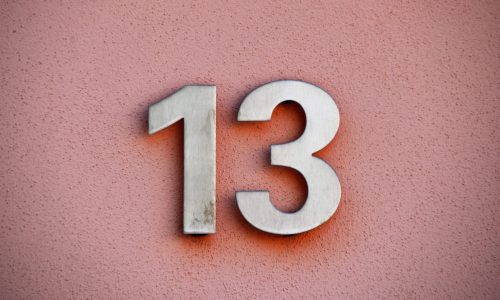
In the vast tapestry of numbers, one holds a special place, both revered and feared – the enigmatic number 13. Throughout history and across cultures, this digit has been surrounded by an aura of mystery, superstition, and even reverence. In this blog, we embark on a journey to unravel the mystique of the number 13, exploring its diverse symbolism, historical significance, and the curious blend of fear and fascination that accompanies it.
The Unlucky Reputation: For many, the number 13 is synonymous with bad luck, a superstition deeply ingrained in various cultures. The fear of the number 13, known as triskaidekaphobia, has led to the omission of the 13th floor in buildings, the avoidance of the number in hotel rooms and airline seats, and a general wariness of Friday the 13th as an allegedly cursed day.
Cultural Symbolism: Contrastingly, in some cultures, the number 13 is considered a symbol of good fortune. In Judaism, for instance, the age of 13 marks the coming of age celebration for boys in the Bar Mitzvah ceremony. In some ancient traditions, there are 13 lunar cycles in a year, tying the number to natural cycles and fertility.
Ancient Year Calendar: Imagine a world where the rhythm of time follows a different cadence, one where the year is harmonized with a calendar of 13 months, each comprising 28 days. In this unconventional temporal tapestry, the symphony of months unfolds with a rhythmic regularity, bringing a sense of balance and order to the passage of days. Such a calendar, with its neatly divided weeks and uniform month lengths, offers a departure from the irregularities of our current system. It invokes a structured and symmetrical dance between the months, challenging our conventional perception of time and inviting contemplation on the possibilities that arise when we reconsider the cyclical nature of our journey around the sun.
Historical and Mythological Significance: The historical significance of the number 13 is diverse. It appears in Norse mythology with the story of a banquet attended by 12 gods where Loki, the trickster god, arrived uninvited, bringing the total to 13 and ultimately resulting in chaos. In Christianity, the Last Supper featured 13 individuals, with Judas Iscariot being the thirteenth.
In Tarot and Numerology: In tarot cards, the Death card is often numbered 13, symbolizing transformation and rebirth rather than literal death. In numerology, the number 13 is associated with upheaval, revolution, and change, suggesting that it can serve as a catalyst for personal and societal transformations.
Cultural References and Pop Culture: The number 13 has left its mark on literature, films, and various aspects of popular culture. From Dan Brown’s “The Da Vinci Code,” where the number 13 is intricately woven into the plot, to its presence in folklore and urban legends, the number continues to captivate the human imagination.
Conclusion: As we navigate the intriguing universe of the number 13, it becomes evident that its mystique transcends mere superstition. Whether feared or revered, the number 13 has woven itself into the fabric of human consciousness, leaving an indelible mark on history, culture, and the collective psyche. In its duality lies a reminder of the power we assign to symbols and the stories we tell, shaping our beliefs and influencing our perspectives on luck, fate, and the ever-fascinating dance between myth and reality.
Great explanations of #13…when this Calendar makes its formal arrival, I will be flying off into the sunset, as my born day will no longer be listed.☀️